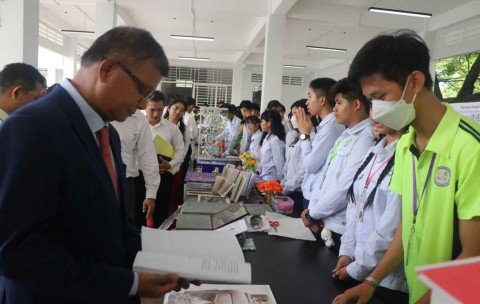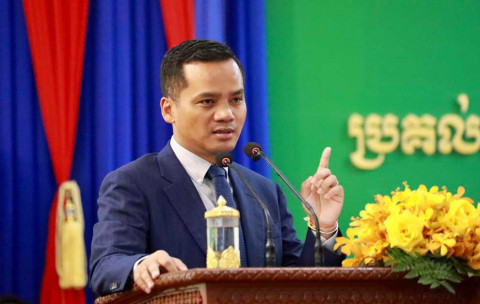
A teacher instructs her pupils at Prek Leap Primary School in Phnom Penh’s Chroy Changvar district last year. Hong Menea
The Ministry of Education, Youth and Sport, along with relevant parties, recently launched the Teacher Policy Action Plan (TPAP) for 2024-30. The initiative is designed to enhance the capabilities of Cambodian teachers, thereby improving the overall quality of education.
The launch ceremony for the plan was led by minister Hang Chuon Naron and UNICEF acting representative in Cambodia Anirban Chatterjee. The event was attended by key officials and representatives from development partners, according to the ministry’s December 10 social media post.
Chuon Naron expressed his gratitude towards both the relevant partners and UNICEF for their collaboration and support in material, budgetary and technical aspects in the preparation of the action plan.
“They have been joining us in the implementation of the TPAP for years and we have achieved many positive outcomes,” he stated.
He added that the ministry would persist in applying the TRAP strategy for teachers who have earned trust and recognition as “producers of knowledge, real implementers at the school level and partners for refining the policy”.
Kong Samneang, head of the Federation of Education Services in Cambodia, praised the initiative on December 11, expressing hope that the plan’s launch would further enhance the quality of teacher training.
He noted the ongoing need for teachers from state schools to share their expertise and teaching methods with the private educational sector.
“In fact, to enhance the quality of teaching, it is essential to refine both effective and innovative training methods to stay abreast of the technological age. I urged the [ministry] to give greater attention to the livelihoods of teachers, as this will act as a catalyst for advancing our educational sector,” he added.
Samneang appealed to the ministry to extend skill training and new teaching methods to teachers in the private sector, similar to those provided to state teachers.
According to the ministry, TPAP is part of the Pentagonal Strategy-Phase I. The government has prioritised the education sector, aiming to develop human capital with advanced knowledge and skills, creativity, entrepreneurial spirit, innovation and ethics. The efforts are directed towards contributing to social development and achieving sustainable and inclusive economic growth.
In order to accomplish the strategy’s objectives, the ministry is committed to ongoing reforms in teacher training institutions. This includes a focus on training programmes, the capacity of educators, technology, libraries and modern study materials, as per the announcement.

























